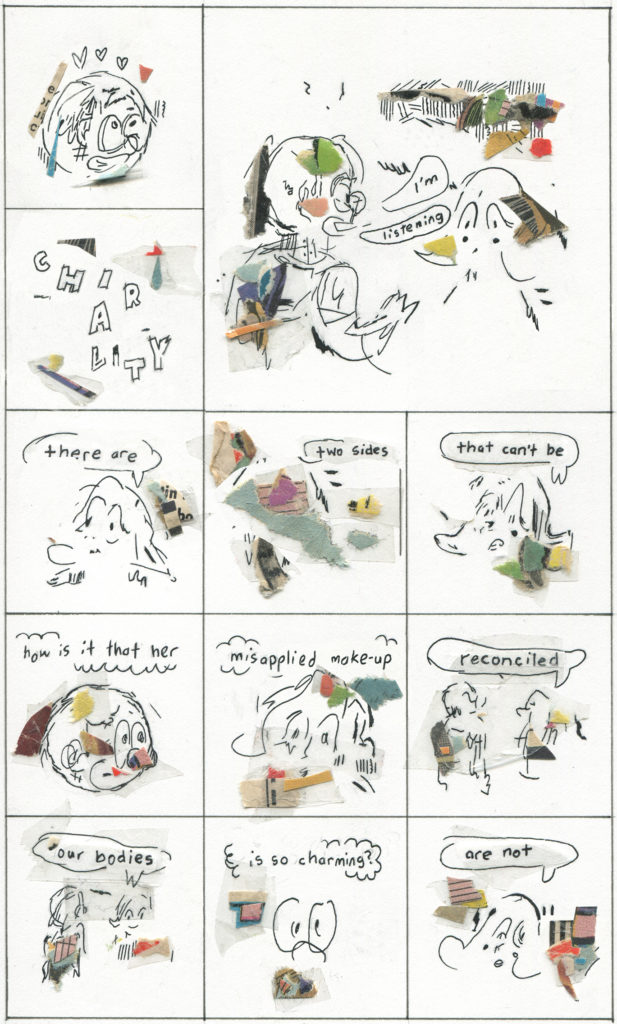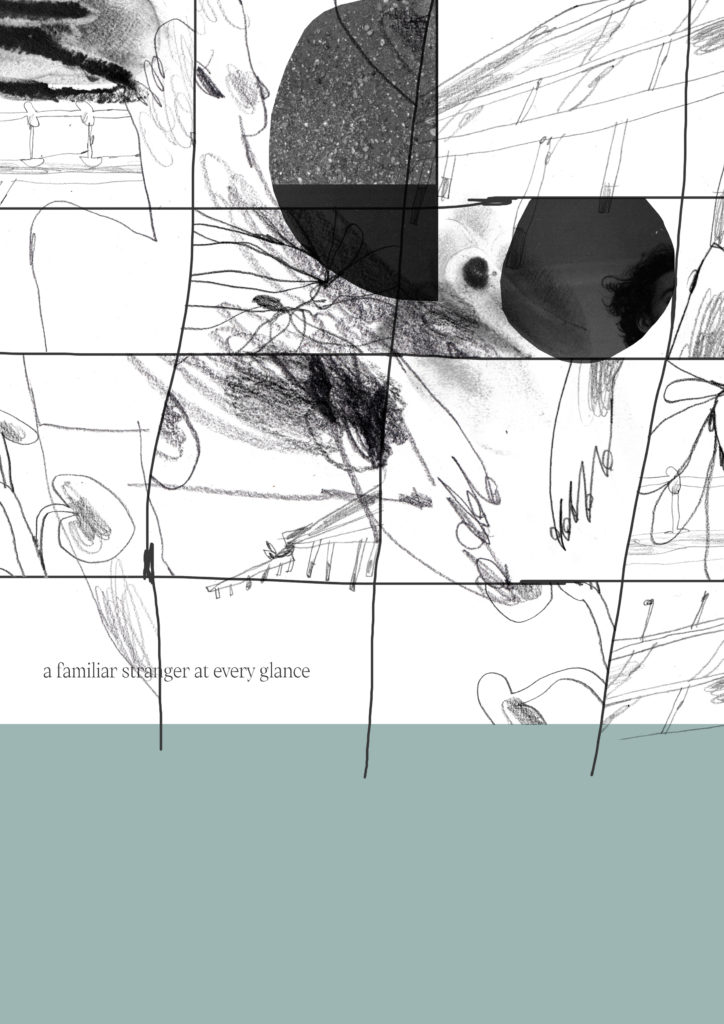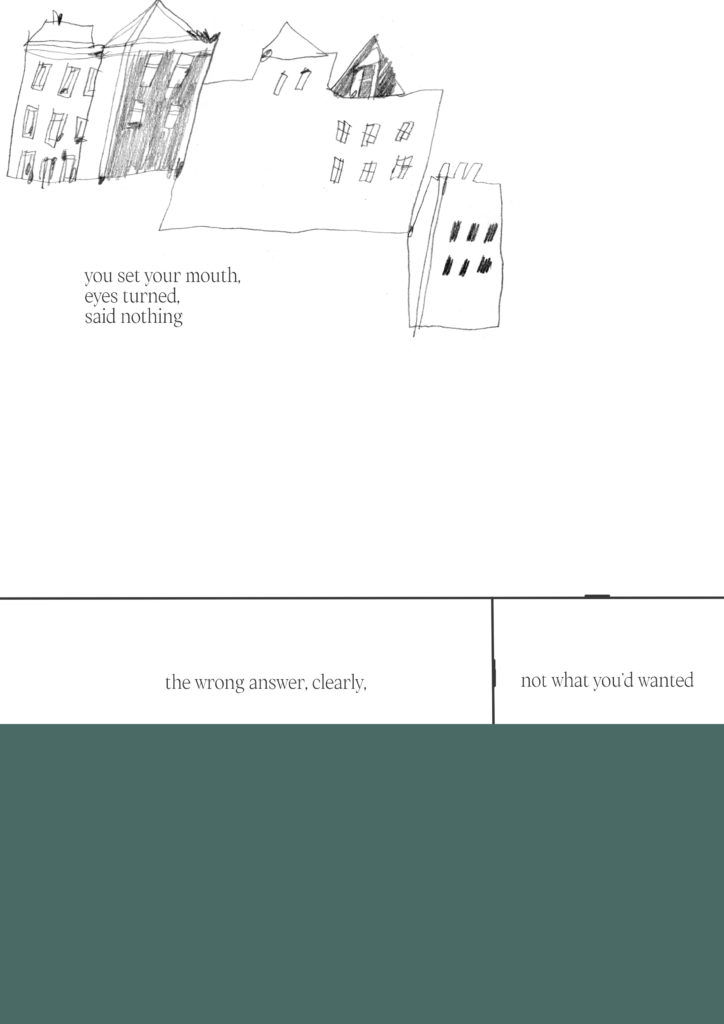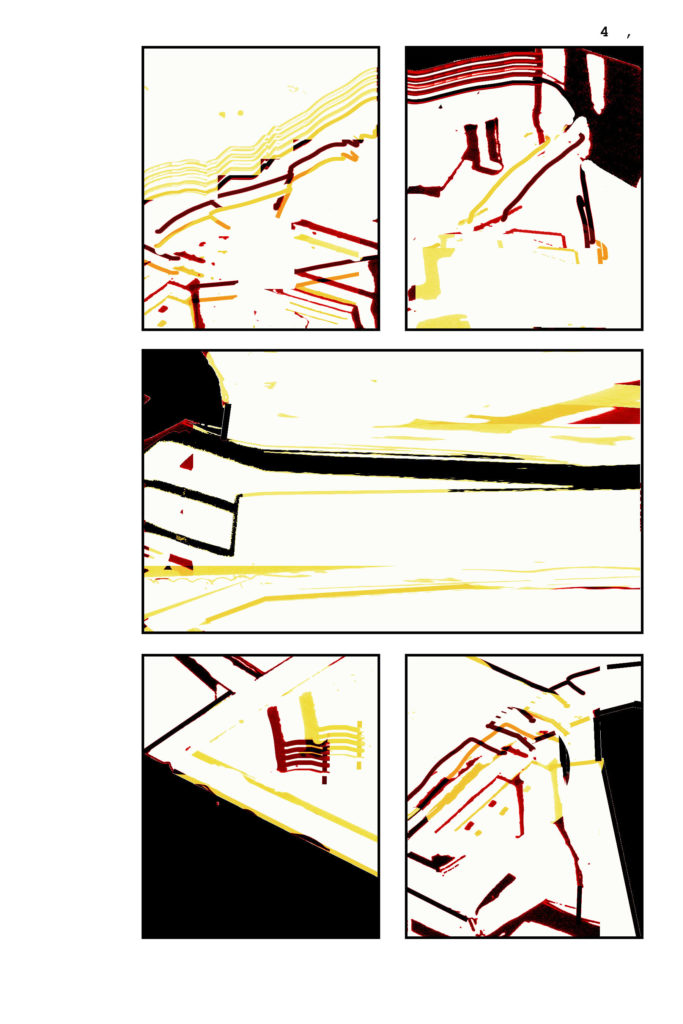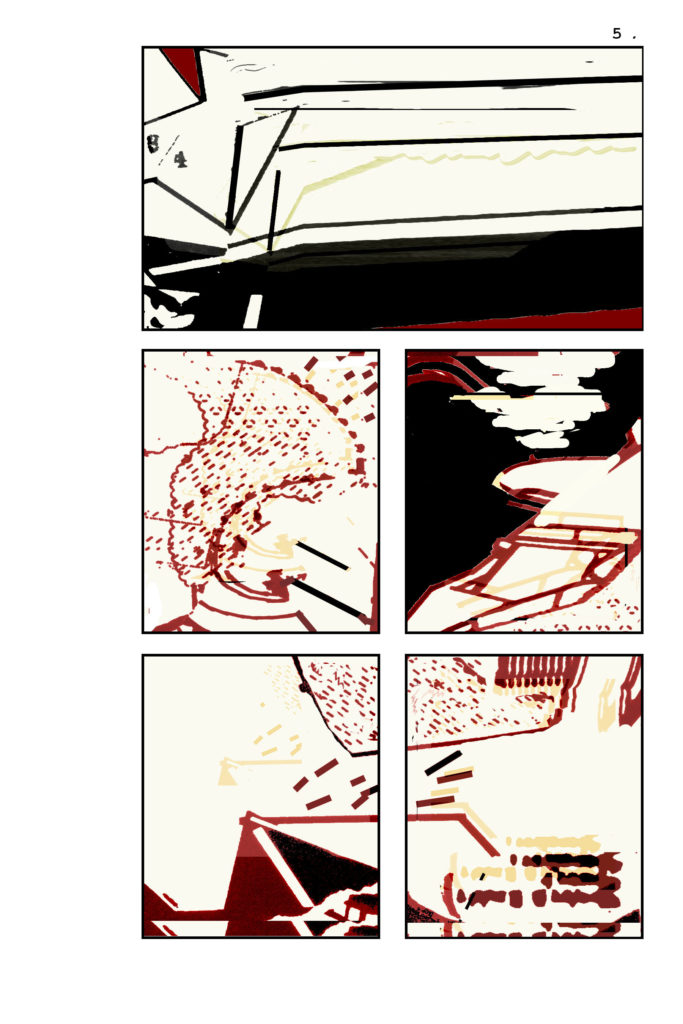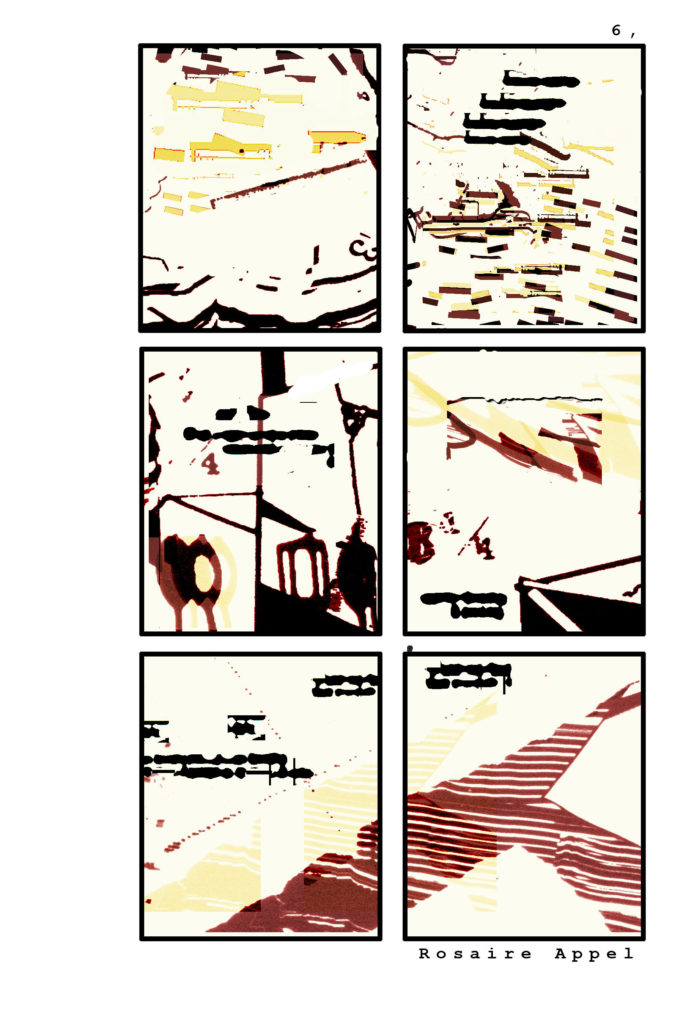Figures in the Sand
S.P. in memoriam
“I draw figures using a short
sharp thorn. on the smooth
surface of the sand
it leaves a trace
that is consistent with the thought.
like a print of light feet
freed of sandals, so quietly it comes.
my hands tremble. my limbs
are not as agile as before. but
I have not lived too long. the longer I think
about the world the bigger it appears.
its roundness all the more perfect.
it slips from my hands
and becomes the substance of thought.
I’ve measured with sand the whole
of the cosmos. it is possible.
provided that words do not fail
to express the number. and yet
I am often struck by the thought
that the finitude of space is absurd.
but what about
infinitude?
surpassing everything it must also exceed
every number and thus every mind. yet
can the unthinkable exist? rather the opposite,
I would think. thought is more expansive
than all of existence. I can
think: Pegasus. everything that my mind
suggests. Homer.
or Sphinx. like that one
resting in the angular shadow
of the pyramids. wind
rips grains of sand
off their edges. though their disappearance
is not visible to the eye.
Democritus would add: ‘you can also think
the gods!’ on this point I refrain
from judgment. Protagoras the Athenian
would have said that the gods did not
create humans, but rather man created gods.
for personal use. and that gods
serve people
like beasts of burden. on their shoulders
man loads the weight of all his transgressions. but
I have not found this in his writings. I do not know whether
he was in fact so profane.
I refrain. when I want to understand the world
it is not to remove
gods. but even without wanting to, I do remove them.
even though I only crawl, only creep
on the slippery surface of the truth. unable
to travel its entirety. is truth also
an infinitude?
with sand
I measure time. it rustles with the beating
of hours. they come foaming
from beyond the horizons.
and they die beyond them. the whole world
and its history and its works
our deeds and our thoughts
all
spill out from the throat of time
as sand.
what is the instant which we christen now? an atom of time
crushed in a quern. between what
maybe will be but is announced in part only.
and that which is no more.
but how do I know about the bygone?
the past. a dark cave entrance covered with debris.
memories. hopes. in what respect
are they different? how would they differ
without my belief
that I am always
the same?
yes.
my atoms
became weary. no wine makes you as drunk
as time does. if atoms exist
at all. if they are in fact the fullness
in my emptiness. if they sift in me,
round and glistening. like pearls. am I thus
an hourglass of pearls?
the ones who died where are they? where are their
roundest atoms?
is somebody’s soul looking at me
from the smooth sand?
or rather a flake of it? broken down by death? maybe
my faithful Trazippos is here somewhere nearby? he probably
had a soul
or almost did.
true.
he could not count. but even the king cannot, probably none
of the rulers can. I submit
that such a soul is in fact
the soul of a slave hamstrung by
lust, rape, intrigue. that soul will not be able
to ascend to the invisible
Palaces of Ether. where thought watches
the harmony of solids,
Pythagorean indeed. is not the hemisphere
the octave of the cone? and is not its fifth
a cylinder? what a melody it is! though it sounds
out of the ear behind the eye
outside the tongue and lyre.
I cannot
talk about it nicely. the wisdom of philosophers
is not pretty. like a flower of the fig tree
all hidden inside. but what can equal
the fruit’s sweetness?
will my theorem also collapse
into sand? or will another world come
in which these proportions
will change? can I conceive
that other cosmos? if I wanted to? no. I cannot.
so either that other world is false
or it is too great a truth. to look into it?
even to get to Egypt
I needed so many days by sail!
no. no. in this I will be eternal even if forgotten.
for is it not true
that the world is indispensable? Epicurus wrote
that the cosmos was always what we see
and such it will remain
without end. for there is nothing
outside it or beside it
which could cause it to change. but how,
how to establish
that the cause of a change needs to be external
to what is being changed? after all,
from my own wish to think
I am changing myself. I am becoming
the cosmos or a cone. spiral.
floating wood. submerged as much
as I indicated. if the cosmos
filled with force, like a wise panther,
has a soul
according to the words of Chrysopus
it can be inspired to think itself.
in a different form.
especially if I can.
moreover, existence
is not the proof of necessity. just like non-existence
shows only contingency. when I close my eyes
without paradox I can think my sand blue. there is
no absurdity in this.
although maybe there would be if I knew more
about the nature of the sand. so what
is necessary? not a thought, not even a thought.
rather like a rock
stormed by a thought. but not conquered.
ever. not
permeated.
the din from the harbor
intensifies. what do they want? what
did you want from me? a few toys? siege devices?
that would fight instead of you? catapults?
their only boast
is that they work. and yet
I would move the Earth.
I could!
if you gave my lever a fulcrum.
I hope no one will discover the point. ever.
the heads
you all could crush! by moving the Earth!
and thanks to me! it is enough
that I let you look into the sun when it burns
wooden ship
on the open sea. though a leaf would suffice
for the sage to see his own face.
or a lump of sand.
I did it.
why did I do it? a smiling sage said
that the people
have the right to defend their rights, like their walls.
I, agreeing, will add: the walls even more so.
only under their guard and their protection survives
the hope for the return of those lost rights.
freedom given by another
is a worse fate
than bondage of one’s own making. an alien liberator
is worse than a tyrant born
within the city walls.
I am drawing circles to reconstruct
Ariston’s thought. he supposedly
doubled the cube. but today the melody
escapes me. all mixed up. screams. getting closer.
why are they screaming so loud?
blood. scorpions
squeeze in across the threshold.
I know so little. I do not even know
if space
conceived
measurable with a thought
is identical with the cosmos. if so
does every line consist of atoms and
emptiness? is the excess of points
created by thought? then the problem of the perimeter
would have to have a finite
solution.
I do not believe that. I put
polygons in a circle and can do it
as long
as the precision of my compass allows me.
and the precision of thought exceeds
that. I want to say—infinitely.
perhaps only a thought is inexhaustible?
maybe my shelter
exists only in my thought? in a tale
which I’m telling myself? so maybe
we torment ourselves
unnecessarily? because the world is simpler
than we suppose?”
Archimedes died by the sword
of a Roman soldier. who was looking for treasures.
but they turned to sand
as he trampled them with his foot. early noon
shone. on a spring
day. birds were falling
stunned by smoke. the soldier
acted against orders.
Marcus Claudius Marcellus, the commander,
ordered his troops to spare the scholar
during the massacre. wanted him
unharmed. he knew that the man
with a mirror
burnt his ships
from a great distance. with Archimedes’s help
the commander hoped
to ignite the ships of others.
Translator’s Note:
Born and educated in Poland, I’ve resided in the U.S. for the past forty years. In that time, I have translated and published almost one hundred poems in literary journals and anthologies by authors writing in Polish, English, German, and Catalan.
On my visits to Poland, I reviewed many books by contemporary Polish writers looking for a poet to fall in love with who has not been translated into English. Grzegorz Białkowski’s Figury z piasku (Figures in the Sand) surprised and challenged me as a poet and translator. The book consists of two epic poetic cycles: Heraclitean Ponderings (23 poems) and Four Essays on the Nature of Light Based on Well-Known Paintings (4 poems). Two longer poems also are included. The book’s title poem is several pages long, and its closing poem, “Life,” even longer. Each section is written in a different poetic key, showcasing the breadth and diversity of Białkowski’s work. His verse is informed by mathematics, physics, astronomy, ancient history, the arts, and nature. His is the poetry of a self-conscious intellectual, artfully styled with alluring images. “Figures in the Sand” is an excellent example of his range and style. In this persona poem, Białkowski imagines Archimedes during the Roman army’s siege of Syracuse in the year 212 BC, pondering grand mathematical and philosophical questions—right up to the moment of his abrupt death.
Białkowski’s style is distinctive. His line and stanza breaks and punctuation add to the challenge of translation. I remain faithful to the poet’s use of punctuation and his choice not to begin sentences with capital letters, but both syntax and the final word of a given line are often different in English. Some line breaks may look different in translation, but the logic and the flow of the poem are most important in my view, and they remain unchanged. The poet’s approach is both formalistic and creative, formulating the key questions, presenting and pondering them, and working on the solutions. These questions are the same today as they were in Archimedes’ time, driving us on a never-ending quest for meaning that transcends mass violence, cultural misunderstanding and intolerance, and human greed and lust for power. Białkowski saw strong similarities between science and poetry—“they both serve to model reality.” Does something exist if we do not think it? I keep finding myself in conversation with the author of “Figures in the Sand.” Were Archimedes’ thoughts, expressed in his figures drawn in the sand, lost for all time? Was Białkowski’s own effort lost? I hope not: I want his voice to be heard, to reach the ears of English readers.

Grzegorz Białkowski (1932-1989) was a Polish physicist, educator, and poet. His poems and prose appeared in prestigious literary journals such as Współczesność, Odra, and Twórczość. Seven collections of his poetry were published by leading presses like Czytelnik and Ludowa Spółdzielnia Wydawnicza. His eighth book, Figury z piasku, was slated for publication in the tumultuous year of 1989, but was shelved and forgotten after his death shortly before he was to be sworn in to the Polish Parliament. In 2015, the manuscript was rediscovered and published by WUW Publishing House.

Danuta E. Kosk-Kosicka is a poet and translator whose work has appeared in numerous magazines and anthologies, including Notre Dame Review, Spillway, Subtropics, and Tupelo Quarterly. Danuta is the author of Oblige the Light (CityLit Press, 2015), winner of the fifth Clarinda Harriss Poetry Prize, and Face Half-Illuminated (Apprentice House, 2015). She has translated four books by the Polish poet Lidia Kosk as well as other Polish poets, including Ernest Bryll, Wisława Szymborska, Stanisław Lem, and Grzegorz Białkowski. Danuta serves as the Poetry Translations Editor for Loch Raven Review. More at: danutakk.wordpress.com.

 BACK TO ISSUE
BACK TO ISSUE






